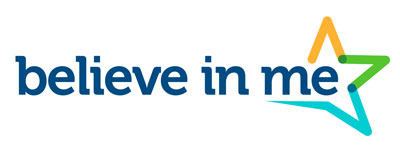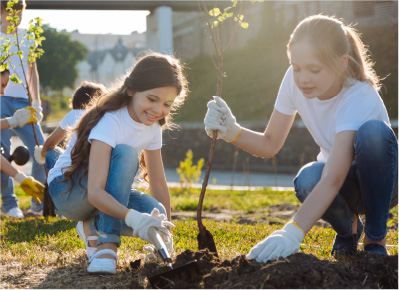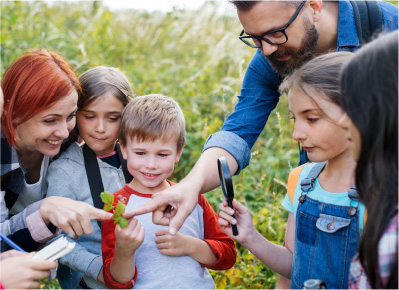Relationships make the world go round. Exploring the concept of relationships can be overwhelming but in this article, we will try to make it simple to understand how building relationships can help youth to achieve their full potential.
To get started, let’s explore what is an interpersonal relationship. This term refers to the association, connection, interaction, and bond between two or more people. Think about your partner, your child(s), your sibling(s), your family, your friends, your teachers at school, and even your neighbors. Every day, we are surrounded by people who contribute to our most positive or even negative involvements. Relationships make up our human experience, and for young people, relationships are the key to how they develop into vibrant adults.
Everyone a young person comes into contact with plays an important role in youth development. These individuals can help kids to develop a positive sense of self, feel valued and connected, and express agency, power, and voice. The opposite can also be true. They are capable of helping a child develop a negative sense of self, lack of value or connection, feel powerless, and without a voice. If children are to develop a healthy sense of self, we must dedicate ourselves to helping provide an environment where they can thrive.
What are Developmental Relationships?
Developmental relationships are based on the premise that all young people need caring adults in their lives who can support their healthy growth. There are five key elements to the development of relationships which include: expressing care, challenging growth, providing support, sharing power, and expanding possibilities. Therefore, when these elements are present, youth are more likely to be engaged in school, trust their peers and adults, and experience positive social, emotional, and cognitive learning. Let’s take a deeper dive into how you can use each element to help children develop a healthy sense of self.
How You Can Use the 5 Elements Of Developmental Relationships to Help Kids
Everyone perceives relationships differently as they move throughout life. We each need different things from different people at different times. Children are no different. Meaningful relationships can be characterized by a dynamic give and take that shapes who we are as we grow, change, and encounter new challenges and circumstances. In fact, the Search Institute has defined the 5 elements of development in ways we can improve our relationships with others, especially with young people.
1) Expressing Care: Show young people that they are valued and appreciated.
For youth, some of the ways to express care are through offering time to listen and ask questions, Following up if they are going through something, or making time for lightness it’s always ideal. In addition, it is important to keep your promises, and praise efforts and achievements.
2) Challenging Growth: Set high expectations and provide opportunities for young people to stretch themselves.
Provide constructive criticism that is respectful and leads to learning. Be sure to emphasize that mistakes are a necessary part of growth and learning.
3) Providing Support: Make yourself available to listen and offer help when needed.
Be responsive to the individual needs of young people and offer assistance that is culturally relevant and developmentally appropriate.
4) Sharing Power: Give young people a voice in decisions that affect them.
Involve youth in planning and decision-making processes and value their input or ask them for advice and solicit their point of view on controversial issues.
5) Expanding Possibilities: Connect young people to resources and opportunities.
Introduce them to new experiences and help them develop the skills they need to pursue their possibilities in their future
Barriers That Marginalized Kids Experience in Building Relationships
When young people feel known, safe, and supported by members of their communities, they are also more likely to achieve their full potential. Sadly, many negative factors have created significant barriers to a sense of belonging across youth populations in our community.
Thanks to the data-driven findings in the report What Drives Learning, we can better understand some of the barriers young people face in building relationships:
- Most high school-age youth do not report experiencing many of the conditions that support their social, emotional, and cognitive learning
- There are notable disparities in high school youth who report experiencing supportive conditions for learning by gender, first language, parent education, race, and urbanicity
- Supportive relationships from multiple sources have independent and additive large positive effects on young people’s reported engagement and meaningful learning
- Belonging or agency combined with supportive relationships amplify the positive association between relationships and reported engagement and meaningful learning
In conclusion, supportive and empowering learning and development environments are sadly the exceptions rather than the norm. For example, underfunded school districts with high student-to-teacher ratios historically provide little opportunity for marginalized youth to form close relationships with adults or collaborate with peers. In these communities, parents may work long hours or be lost in addiction, leaving these vulnerable children without the support they need. Unfortunately, their peers may also be lacking in adult guidance, experiencing abuse, or struggling to meet their own needs. As a result, these kids often miss out on building the developmental relationships and social-emotional strengths that are so crucial for success in life.
Believe in Me’s Role in Helping Marginalized Kids By Building Positive Relationships
Believe in Me is dedicated to helping youngsters build healthy relationships with themselves and those around them by making grants to programs that are implementing restorative justice practices in our schools and communities, which focus on repairing relationships rather than punishing individuals. Additionally, we are dedicated to creating inclusive environments where all young people feel welcome and valued by offering transformative experiences, empowering, personalized, and culturally affirming. When young people feel like they belong, they are more likely to thrive.
We believe in kids and we want to inspire them to believe in themselves by giving grants that fulfill our mission and these five pillars of caring to develop a real and lasting positive impact on the community: Transitional Living, Foster Care & Adoption, Wraparound Services, Education and Enrichment.
Giving of your time, talents, and treasures help every kid in our community to believe in themselves and to have the support to become their best selves.






